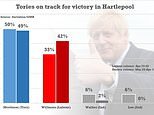Voters across Great Britain will go to the polls on May 6 on what has been dubbed ‘Super Thursday’.
Every adult in England, Scotland and Wales will be entitled to vote in at least one contest.
The results could provide a critical marker for the direction of Britain – and in the case of Scotland, give an indication of whether Nicola Sturgeon’s drive for another independence referendum will get traction.
Here is a run-down of the different contests happening on Thursday:
Scottish Parliament
Voters in Scotland will elect 129 MSPs in a crucial contest which will give an indication of the level of support for the SNP’s push for a fresh vote on independence.
People will cast two ballots under the additional member system – a form of proportional representation – electing both constituency and regional MSPs.
Votes for the individual candidates in the 73 constituencies are counted first.
The 56 regional MSPs – split across eight regions – are elected using a formula aimed at ensuring that the number of seats a party gets in total across a region is about the same as the percentage of votes it receives.
Welsh Parliament
Labour has run Wales since devolution and Mark Drakeford hopes to maintain the party’s grip on the Senedd.
The additional member system is used to elect 40 constituency and 20 regional members.
Hartlepool by-election
The contest to elect Hartlepool’s next MP provides a key test for Labour leader Sir Keir Starmer. The party held the seat in 2019 with a majority of 3,595.
But the ‘red wall’ across the north crumbled, handing Boris Johnson the keys to No 10, so the by-election will give an indication of whether Sir Keir has been able to reverse the process that has seen Labour’s heartlands disappear.
Bookmakers have made the Tories odd-on favourites to secure the seat, a rare feat for a governing party.
As in a general election, the first-past-the-post system is used – whoever gets the most votes wins the seat.
London
In London, Labour’s Sadiq Khan is the bookies’ favourite to retain City Hall.
Voters choose the mayor using the supplementary vote system, picking a first and a second preference for the job. If a candidate receives more than half of all the first choice votes they are elected. If this does not happen, the two candidates with the most first choice votes go through to another round, with second preferences from the eliminated candidates taken into account.
Voters in the capital will also elect 25 London Assembly Members using a system similar to that in Scotland and Wales.
English mayors
Regional mayors will be elected for Cambridgeshire & Peterborough, Greater Manchester, the Liverpool City Region, Tees Valley, West Midlands, West of England and – for the first time – West Yorkshire. High-profile names seeking re-election include Labour’s Andy Burnham in Greater Manchester and Tory Andy Street in the West Midlands.
Five local mayors are also due to be elected on May 6, for the local authorities of Bristol, Doncaster, Liverpool, North Tyneside and Salford.
Like the London mayoral contest, the supplementary vote system is used.
Local elections
There will be 21 county councils holding elections, along with 28 unitary authorities, 59 district councils and 35 of the 36 metropolitan boroughs (the one exception is Birmingham, where elections will take place in 2022).
In total around 5,000 councillors are due to be elected, all using the first-past-the-post system.
Police and Crime Commissioner (PCC) elections
PCCs will be elected in all areas of England apart from London, Greater Manchester and West Yorkshire, where these powers are held by the directly-elected mayor. A total of 39 commissioners will be chosen across England and Wales using the supplementary vote system.
